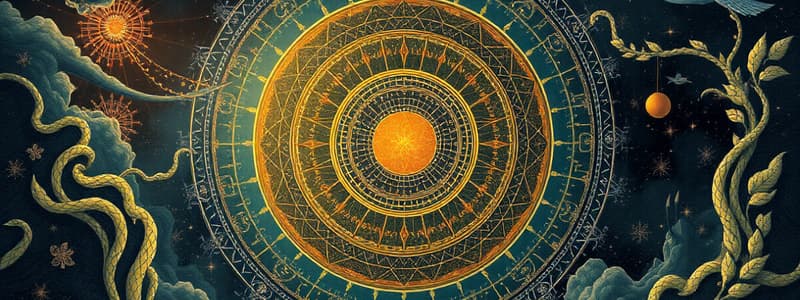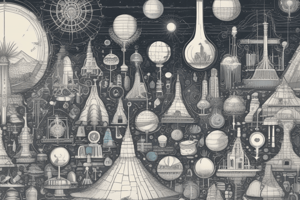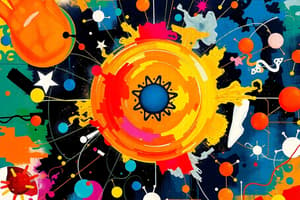Podcast
Questions and Answers
What is a hypothesis?
What is a hypothesis?
A proposed explanation based on some evidence.
How does a hypothesis become a theory?
How does a hypothesis become a theory?
Once the hypothesis is scientifically tested and proven.
A theory is an idea that is always proven scientifically.
A theory is an idea that is always proven scientifically.
True (A)
What is necessary for a solar system to form from a nebula?
What is necessary for a solar system to form from a nebula?
What are nebulas?
What are nebulas?
What gases mainly compose a nebula?
What gases mainly compose a nebula?
High pressure causes a nebula to ______.
High pressure causes a nebula to ______.
Gravity causes particles in a nebula to drift apart.
Gravity causes particles in a nebula to drift apart.
What can upset the balance between gravity and pressure in a nebula?
What can upset the balance between gravity and pressure in a nebula?
What is the composition of the present atmosphere?
What is the composition of the present atmosphere?
Flashcards are hidden until you start studying
Study Notes
What is a Hypothesis
- An explanation based on limited evidence
- A starting point for further investigation
- Not scientifically tested or proven
- It can be accurate or inaccurate
What is a Theory
- A set of ideas explaining facts or events
- Formulated after extensive research and analysis
- Scientifically proven with evidence
- Can be used for understanding, explanation and prediction
- Theories can be proven wrong depending on the proof
How Solar Systems Form
- Solar systems originate from nebulas, which are clouds of gas and dust in space.
- Our solar system likely formed from the solar nebula, composed of gases like hydrogen and helium, and dust containing elements like carbon and iron.
- Two forces drive the formation of solar systems from nebulas: Gravity and Pressure.
Gravity
- Gravity pulls matter together
- The particles in a nebula are very small and spaced apart
- Gravity is weak but sufficient to prevent the nebula from drifting apart
Pressure
- Pressure pushes matter apart
- Particles in a nebula constantly move and collide, creating pressure within the nebula
- Pressure is higher with closer particles increasing collisions
Balance Between Gravity and Pressure
- High pressure makes the nebula expand, lessening pressure
- Gravity pulls particles together increasing pressure
- When the nebula reaches the right size, pressure and gravity equilibrate, keeping the nebula stable
Upsetting the Balance
- Supernovas can disrupt the balance in a nebula
- This causes compression in small regions of the nebula, creating globules
- Globules become dense, gravity causes them to collapse, leading to increased temperature
- The hot, dense globule can eventually become a star
Formation of the Solar System
- Our solar system took about 10 million years to form from the solar nebula
- Important events during formation include:
- Initial cloud of gas and dust
- Compression into a dense disk
- Formation of the sun at the center of the disk
- Formation of planets from remaining material
Studying That Suits You
Use AI to generate personalized quizzes and flashcards to suit your learning preferences.




